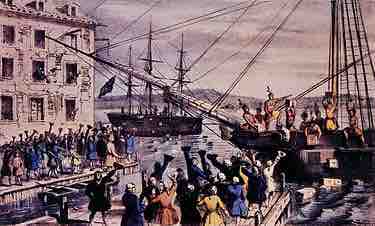After the French and Indian War, the British needed to find a way to repay war debt. They imposed new taxes and penalties to increase revenue for the kingdom. In 1764, George Grenville became the British Chancellor of the Exchequer. He allowed customs officers to obtain general writs of assistance, which allowed officers to search random houses for smuggled goods. Grenville thought that if profits from smuggled goods could be directed towards Britain, the money could help pay off debts. Colonists were horrified that they could be searched without warrant at any given moment. With persuasion from Grenville, Parliament also began to impose several new taxes on the colonists in 1764.
The Sugar Act of 1764 reduced the taxes imposed by the Molasses Act, but at the same time strengthened the collection of the tax. It also stipulated that British judges—not juries—would try Sugar Act cases. In 1765, Parliament passed the Quartering Act, which required the colonies to provide room and board for British soldiers stationed in North America. The soldiers' main purpose was to enforce the previous acts passed by Parliament. Following the Quartering Act, Parliament passed one of the most infamous pieces of legislation: the Stamp Act.
Prior to the Stamp Act, Parliament imposed only external taxes on imports. The Stamp Act provided the first internal tax on the colonists, requiring that a tax stamp be applied to books, newspapers, pamphlets, legal documents, playing cards, and dice. The legislature of Massachusetts requested to hold a conference concerning the Stamp Act. The Stamp Act Congress met in October 1765, petitioning the King and Parliament to repeal the act before it went into effect at the end of the month. The act faced vehement opposition throughout the colonies. Merchants threatened to boycott British products. Thousands of New Yorkers rioted near the location where the stamps were stored. In Boston, the Sons of Liberty, a group led by radical statesman Samuel Adams, destroyed the home of Lieutenant Governor Thomas Hutchinson. Parliament repealed the Stamp Act but passed the Declaratory Act in its wake. The Declaratory Act stated that Great Britain retained the power to tax the colonists without substantive representation.
Believing that the colonists only objected to internal taxes, Chancellor of the Exchequer Charles Townshend proposed bills that would later become the Townshend Acts. The Townshend Acts, passed in 1767, taxed imports of tea, glass, paint, lead, and even paper. Again, colonial merchants threatened to boycott taxed products. Boycotts reduced the profits of British merchants, who, in turn, petitioned Parliament to repeal the Townshend Acts. Parliament eventually agreed to repeal much of the Townshend legislation, but they refused to remove the tax on tea, maintaining that the British government retained the authority to tax the colonies.
In 1773, Parliament passed the Tea Act, which exempted the British East India Company from the Townshend taxes. Thus, the East India Company gained a great advantage over other companies when selling tea in the colonies. The colonists who resented the advantages given to British companies dumped British tea overboard in the Boston Tea Party in December of 1773 .

Boston Tea Party
The Boston Tea Party was orchestrated by the Sons and Daughters of Liberty, who fiercely protested the British-imposed taxes.